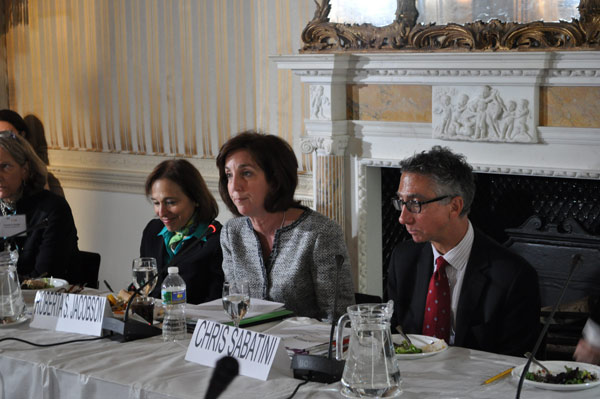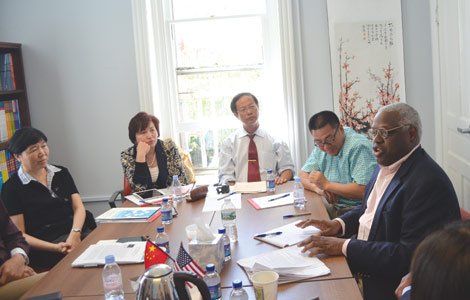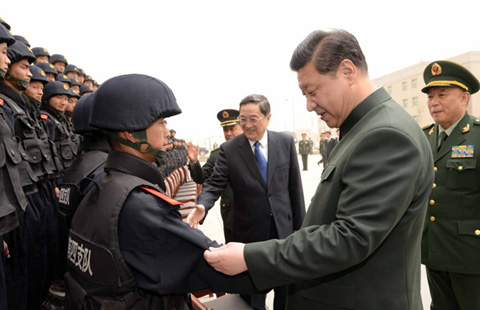US not being edged out of Latin America: State dept official
Updated: 2014-04-30 07:46
By MICHAEL BARRIS in New York (China Daily USA)
|
||||||||
A US assistant secretary of State criticized the US media's "Chicken Little" views on China's growing engagement with Latin America, saying "it's not a question of someone edging us (the US) out of a market".
"That's an exaggeration," Roberta Jacobson, assistant secretary of state for Western Hemisphere affairs, said during a talk at the Americas Society/Council of the Americas in Manhattan on Tuesday.
 |
|
Roberta Jacobson, US assistant secretary of State for Western Hemisphere affairs, speaking Tuesday at the Americas Society/Council of the Americas in Manhattan. (MICHAEL BARRIS/CHINA DAILY) |
Calling the US's Latin America relationships "the strongest they've ever been", Jacobson said in response to an audience member's question that she is "not particularly worried about (the US) becoming obsolete in the region" despite media reports that have suggested the country is "losing influence" in a part of the world considered its backyard. Jacobson attributed the negative portrayal to a US media obsession with the invading "country of the moment".
"One day it's China, one day Russia," she said.
Jacobson compared the reports to the tale of Chicken Little, the fictional chicken who shouts "the sky is falling" because of her hysterical and mistaken belief that the world is coming to an end and disaster is imminent.
It helps the US "enormously" to discuss Latin America and the Caribbean from time to time with China's leaders, Jacobson said. "Frankly, 10 years ago when they began, people would ask me, why are you having conversations with the Chinese on Latin America?" she said. "Nobody asks me that question anymore. It's now very obvious why we have those conversations."
Chinese President Xi Jinping visited the region last year. He met with the leaders of Suriname, Guyana, Antigua and Barbuda, Grenada and Barbados.
Although China's purchases of Latin American commodities reflects "very robust" cross-regional trade that has helped pull some of the poorest countries out of poverty, "that does not in any way shape or form become a zero-sum game with the United States", Jacobson said. "It's not a question of someone edging us out of a market. Quite the contrary."
"China's trade with this region can be a very, very good thing for both sides," she said. "It can be win-win for those two parties but only if it is transparent and follows rules of international and local especially when it comes to labor and environment."
In her formal remarks, Jacobson said it was "no surprise", given economic growth on both sides of the Pacific, that Asia and Latin America "have recognized each other's potential".
"China is obviously the top recipient of several commodities exports from several South American countries," she said. "Many of our hemispheric neighbors are concluding trade or investment agreements with Asian partners. And obviously Japan, China and South Korea are important sources of foreign direct investment in Latin America and the Caribbean. We do not and should not fear Asia's economic interest in this hemisphere, provided those relationships are transparent and the rules are respected."
The US remains "strategically engaged with the Americas even while recognizing and encouraging the region's positive ties across the Pacific with Asia", Jacobson said. She urged the audience to think of those increasingly interconnected regions as "an integrated whole — a broader Pacific with commonalities beyond geographic proximity".
"Our strategies in each region must be mutually enforcing," Jacobson said. "If we can deepen and consolidate a consensus in our hemisphere behind an open, free and transparent, fair economic competition coupled with a commitment to democratic processes, the rule of law, labor rights and social inclusion, then that will benefit not only our citizens here at home but strengthen our collective position as together we promote common values in the Americas and across the Pacific."
Most Viewed
Editor's Picks

|

|

|

|

|

|
Today's Top News
NBA bans Clippers owner from game for life over racist commen
China's CEOs confident
Alibaba IPO could be the biggest
Chinese youths get their chance at stardom and recording deals
Cookiemaker announces plans to roll into smaller cities
Bill Gates urges more in China to help poor
Philippine pact gives US access to air, sea bases
Obama sets new sanctions on Russia
US Weekly

|

|
















